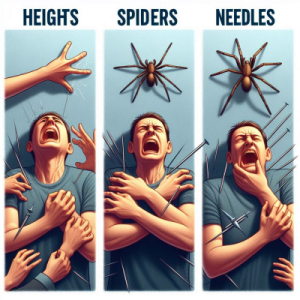Did you know that approximately 12.5% of adults in the United States will experience a specific phobia at some point in their lives? Fear can manifest in various forms, affecting your daily routines and overall well-being. Understanding how these phobias impact your health is essential. Let’s explore seven common phobias that could be silently influencing your life.
Fear of Heights
 If you experience an intense fear of heights, known as acrophobia, it can greatly impact your physical and mental well-being.
If you experience an intense fear of heights, known as acrophobia, it can greatly impact your physical and mental well-being.
Risk factors for developing acrophobia include a family history of anxiety disorders, traumatic experiences involving heights, or individual temperament.
Coping strategies can help manage acrophobia and improve your quality of life.
Exposure therapy, where you gradually confront heights in a controlled manner, has shown effectiveness in reducing fear responses.
Cognitive-behavioral techniques can also be beneficial by challenging negative thought patterns related to heights and replacing them with more rational beliefs.
Relaxation techniques such as deep breathing or mindfulness can help alleviate anxiety symptoms when faced with heights.
Physical exercise has been linked to reducing anxiety levels, making it a valuable tool in managing acrophobia.
Seeking support from mental health professionals or joining support groups can provide guidance and encouragement in overcoming your fear of heights.
Social Anxiety Phobia
Experiencing a persistent and overwhelming fear of social situations, known as social anxiety phobia, can greatly impact your daily functioning and well-being. Research indicates that individuals with social anxiety phobia may struggle with forming and maintaining relationships, leading to feelings of isolation and loneliness. This fear can impede your ability to engage in social activities, attend gatherings, or even perform well at work or school.
Therapy options such as cognitive-behavioral therapy (CBT) and exposure therapy have been shown to be effective in treating social anxiety phobia. These therapies focus on changing negative thought patterns and gradually exposing individuals to feared social situations to reduce anxiety levels. Additionally, practicing relaxation techniques, mindfulness, and deep breathing exercises are helpful coping mechanisms in managing social anxiety phobia.
The impact of social anxiety phobia on relationships can be profound, as it may lead to avoidance of social interactions, misunderstandings, and conflicts. Daily activities like going to social events, making phone calls, or speaking in public can become challenging tasks.
Seeking professional help and learning effective coping strategies are essential steps in managing social anxiety phobia and improving your quality of life.
Claustrophobia
Individuals with claustrophobia often experience intense fear or anxiety in enclosed or confined spaces. This fear can lead to panic attacks, where symptoms like rapid heartbeat, sweating, trembling, and shortness of breath may manifest.
The thought of being trapped or unable to escape can trigger these panic attacks, making it difficult for individuals to function normally in such situations.
Cognitive behavioral therapy (CBT) is a common and effective treatment for claustrophobia. Through CBT, individuals learn to identify and challenge negative thought patterns that contribute to their fear of enclosed spaces.
Therapists may use techniques like exposure therapy, where patients are gradually exposed to confined spaces in a controlled environment, helping them confront and overcome their fears over time.
If you or someone you know struggles with claustrophobia, seeking help from a mental health professional trained in CBT can provide valuable support in managing this phobia and improving overall quality of life.
Fear of Flying
The fear of flying, also known as aviophobia, is a common phobia that can greatly impact individuals’ travel experiences and overall well-being. It can trigger intense anxiety, panic attacks, and physiological distress when faced with the prospect of flying or even thinking about it.
Cognitive behavioral therapy (CBT) has been identified as an effective treatment for aviophobia. Here’s how it can help:
-
Identifying Negative Thought Patterns: CBT helps individuals recognize and challenge irrational beliefs related to flying, such as catastrophic thinking about plane crashes.
-
Gradual Exposure: Therapists may use techniques like gradual exposure to flying-related stimuli to desensitize individuals to their fears and reduce anxiety levels.
-
Learning Coping Strategies: CBT equips individuals with coping mechanisms to manage anxiety symptoms, such as deep breathing exercises or visualization techniques during flights.
-
Developing Positive Associations: Through CBT, individuals can reframe their thoughts about flying, creating positive associations and reducing fear responses.
Arachnophobia
Fear of spiders, known as arachnophobia, is one of the most prevalent specific phobias among the population. This fear is often fueled by concerns about spider bites, even though most spider species are harmless to humans. Research suggests that cognitive therapy is an effective treatment for arachnophobia. Through cognitive therapy, individuals learn to challenge and reframe their negative thoughts about spiders. By addressing these thought patterns, individuals can gradually reduce their fear response when encountering spiders.
Spider bites, although rare and usually harmless, can exacerbate the fear of spiders for those with arachnophobia. It’s important for individuals with this phobia to seek proper treatment to manage their fear and anxiety effectively. Cognitive therapy can help individuals develop coping mechanisms and strategies to confront their fear in a controlled environment. Over time, this can lead to a reduction in the intensity of their phobia and improve their overall quality of life.
Agoraphobia
For individuals dealing with agoraphobia, managing everyday situations can become overwhelming due to a fear of being in places or situations where escape might be difficult or embarrassing. Agoraphobia often leads to severe anxiety and can impact various aspects of life.
Here are some key points to keep in mind:
-
Panic Attacks: Agoraphobia is commonly associated with panic attacks that can be triggered by being in crowded places, open spaces, or situations perceived as uncontrollable.
-
Avoidance Behavior: Individuals with agoraphobia may start avoiding certain places or situations to prevent panic attacks, which can restrict their ability to engage in daily activities.
-
Cognitive-Behavioral Therapy (CBT): CBT is a widely used treatment option for agoraphobia, helping individuals identify and change negative thought patterns and behaviors associated with their fears.
-
Medication: In some cases, doctors may prescribe medications such as antidepressants or anti-anxiety drugs to manage symptoms of agoraphobia alongside therapy. It’s essential to consult with a healthcare professional to determine the most suitable treatment approach for each individual.
Germophobia
Individuals with germophobia experience an intense and irrational fear of germs and contamination. This phobia can have a significant impact on daily life, leading to excessive hand washing, avoiding public places, and using hand sanitizer excessively.
While some level of caution is necessary to prevent illness, germophobia can become disabling when it interferes with regular activities. Using hand sanitizer excessively may seem like a quick fix for germophobes, but it can result in negative consequences such as dry skin and the emergence of antibiotic-resistant bacteria.
It’s essential for individuals with germophobia to seek help from mental health professionals who specialize in anxiety disorders. Therapy options such as cognitive-behavioral therapy (CBT) can be valuable in addressing the underlying causes of germophobia and teaching healthier coping mechanisms.
Conclusion
To address phobias that can impact your health, such as fear of heights, social anxiety, claustrophobia, fear of flying, arachnophobia, agoraphobia, and germophobia is crucial.
Seeking professional help and utilizing effective coping strategies can help you overcome these fears and improve your overall well-being.
Remember, conquering your phobias is like taking a giant leap towards a healthier and happier life.





